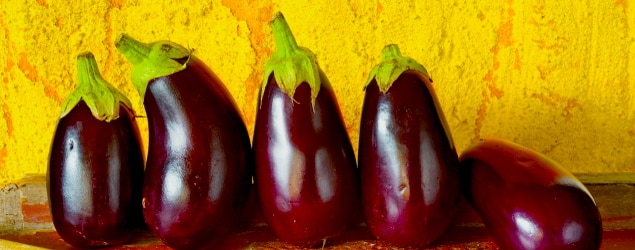Masked Eggplant Thugs Plant a Field of Lies

You may know it as an “eggplant,” but in Bangladesh, where it is considered a staple crop, it goes by the name “brinjal.” Last year, a biotech variety of the purple fruit, meant to resist attacks from insects, was approved for cultivation in Bangladesh.
The variety, called “Bt brinjal,” borrows a gene from a common soil bacterium that fortifies it with a protein insects don’t like, but is harmless for humans and animals to eat. Specifically, the plant is protected against fruit and shoot-boring insects that otherwise regularly infest the plants. (Varieties of Bt corn have been planted in the United States for almost 15 years).
Last week, the new eggplant was the center of controversy there. A headline in the Bangladesh Financial Express (FE) read “Pest-resistant Bt Brinjal comes under pest attack.” The article claimed that the new variety of biotech brinjal had failed to protect itself from pests as promised, was suffering from insect infestation and, on top of all that, was a severe health hazard to humans.
The article focused on an allegedly upset Bt brinjal farmer, Haidul Islam. The article said this of Islam’s fields:
Visiting his brinjal field on Tuesday, the FE correspondent found 25-30 per cent of the plants dead and the rest were struggling for survival.
The article also included a quote from an allegedly unhappy Islam:
“Agriculture officials told me that I am one of the 20 fortunate farmers who got Bt seeds. It will reduce cost for pesticide. But the reality is pests have attacked my plants severely. Last year I grew local varieties and made profit. This year Allah knows what will happen to me.”
Worried that something had gone wrong with the farmer’s crop, project scientists (who included a partnership of the Bangladesh Agricultural Research Institute (BARI) and Cornell University) showed up at Islam’s door to investigate. What they found was even more shocking than a would-be failure of their technologically advanced crop.
The researchers first set about testing the farmer’s plants. When they found them to be “healthy and infestation-free” and working as expected, they asked the farmer why he would tell a newspaper reporter otherwise. That’s when they got the real story.
Earlier in the week, two masked thugs paid a visit to Islam and tried to threaten him into making a video statement saying that his crops were infested and failing.
. . . two young men visited his farm and told him that he was growing a “poisonous” crop on his vegetable patch which would be bad for the health of him and his family. The two men did not reveal their identities, and moreover wore black cloth masks on their faces for the duration of their visit.
From behind the black masks, they told Islam that he would be a “happy man” if he would do as he was told. When Islam refused, because he thought there was nothing wrong with his crop, the activists apparently decided to put their words into his mouth for the article anyway.
The anti-GMO goons may not have removed their masks the whole time they were at Islam’s farm, but their actions unmask their fear of the success of biotech brinjal. They will try anything to scare Bangladeshi farmers into refusing the new technology, including shaking down farmers and planting fields of newspaper lies.
As farmers start to see the benefits of growing the crop, the number planting Bt brinjal in Bangladesh is expected to grow steadily. But just as the brinjal is fortified against attacks from gnawing pests, Bangladeshi farmers will have to fortify themselves with the facts that will protect them against anti-GMO activist attacks.
Read the account of what happened here.



